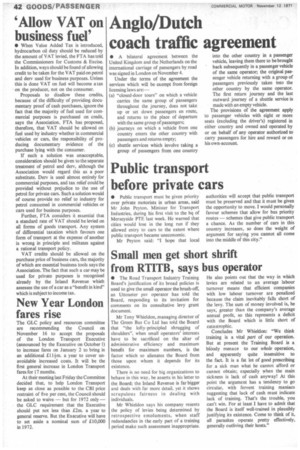'Allow VAT on business fuel'
Page 44

If you've noticed an error in this article please click here to report it so we can fix it.
• When Value Added Tax is introduced, hydrocarbon oil duty should be reduced by the amount of VAT levied, the FTA has told the Commissioners for Customs & Excise. In addition, ways should be found of allowing credit to be taken for the VAT paid on petrol and dery used for business purposes. Unless this is done VAT on fuel will become a tax • on the producer, not on the consumer.
Proposals to disallow these credits, because of the difficulty of providing documentary proof of cash purchases, ignore the fact that the majority of fuel used for commercial purposes is purchased on credit, says the Association. FTA has proposed, therefore, that VAT should be allowed on fuel used by industry whether in commercial vehicles or cars, the responsibility of producing documentary evidence of the purchase lying with the consumer.
If such a solution was unacceptable, consideration should be given to the separate treatment of petrol and derv, although the Association would regard this as a poor substitute. Dery is used almost entirely for commercial purposes, and tax relief could be provided without prejudice to the use of petrol for private cars. Such a solution would of course provide no relief to industry for petrol consumed in commercial vehicles or cars used for business purposes.
Further, FTA considers it essential that a standard rate of VAT should be levied on all forms of goods transport. Any system of differential taxation which favours one form of transport at the expense of another is wrong in principle and militates against a rational transport policy.
VAT credits should be allowed on the purchase price of business cars, the majority of which are essential business tools says the Association. The fact that such a car may be used for private purposes is recognised already by the Inland Revenue which assesses the use of a car as a "benefit in kind" which is subject to income tax.










































































































































































































